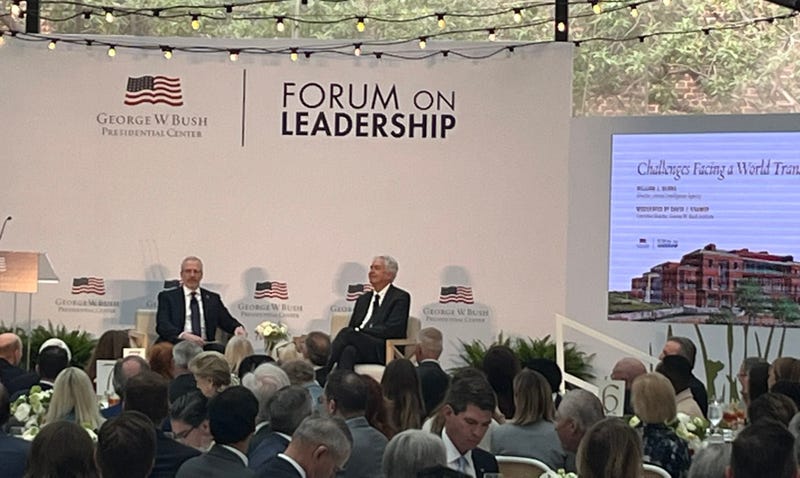
The George W. Bush Presidential Center at SMU hosted a forum Thursday on the worldwide impact of autocratic regimes. CIA Director William Burns spoke at the event with the theme "The Call of Freedom."
"If the United States withdraws, the world gets worse," Former President George W. Bush said during the event. "If we expect to be secure at home, we'd better worry about the lives of others abroad.
Burns served as Bush' assistant secretary of state for Near East affairs from 2001 to 2005 and ambassador to Russia from 2005 to 2008. He said Congress should take action on aid packages for Ukraine and Israel.
"Ukrainians are not running out of courage and tenacity. They're running out of ammunition, and we're running out of time to help them," he said.
Burns said autocratic governments are increasingly likely to try to reach outside their own borders to intimidate or even kill opposition. He said he met with Vladimir Putin in early November of 2021, three months before the invasion started.
"I must say I found him totally unapologetic about what he was planning to do," he said. "I came back and told the president I was convinced they were going to go."
Burns said that intelligence prompted the Biden Administration to help Ukraine prepare a defense and also led to the formation of a coalition to support Ukraine. He said defense of Ukraine is showing other autocratic nations democracies will come together to support each other in times of crisis.
"There's an enormous amount at stake here," he said. "I think in the first year or two of Putin's aggression in Ukraine, Xi Jinping in China was sobered by what he saw. Like Putin, he expected the Russian military was going to just walk right over the Ukrainians. He did not expect the United States and our European allies would stand up in support of Ukrainians. He did not expect we would be able to impose economic costs on Russia and absorb some economic costs ourselves."
Burns said that may have led to Xi rethinking his ambitions in Taiwan.
"Now is not the time to pull back. Now is the time, in fact, to deepen our support for those fighting for freedom around the world," says David Kramer, executive director of the George W. Bush Institute.
Kramer says America's best allies and trading partners are democracies; the countries that are most threatening have authoritarian leadership.
"For us, it is incredibly important to understand when freedom grows and spreads around the world, that will mean a more stable world. That will mean a more prosperous world. That will mean a safer world," he says.
Kramer says Putin does not respect the human rights of his own people, and that is reflected in his foreign policy. He says that lack of respect for human rights indicates Putin would not stop simply by conquering Ukraine, so Russia could become a threat to NATO allies in the Baltics.
Similarly, Kramer says Iran does not respect the human rights of its people, so he says other nations should not be surprised that Iran has become a leading sponsor of terrorism.
He says Russia's invasion of Ukraine has been failing because the United States and allies in Europe have offered help, but as the war continues, he says allies need to maintain the fight.
"There's no question Ukrainians know why they're fighting," he says. "The Russians who are there really have no idea why they've been sent there. The Russians are dying in the hundreds of thousands, being killed and injured. The Ukrainians are also suffering terribly, but they are defending their land, their freedom, their lives, their independent identity and their right to determine their own future."
The day-long forum also had panels on how human rights factor into competition among world powers, protecting religious liberty and how activists are pushing back against totalitarian regimes.
"My story is about hope and resilience, but this is a story that's only possible with the support of great people willing to give a chance to strangers," says Joseph Kim, who escaped North Korea after his father died of starvation and he was separated from his mother and sister.
Kim claimed refugee status and now works as program manager for global policy at the Bush Institute. He says he rejects the idea human rights and security are separate issues.
"I believe it is impossible to achieve credible and sustainable national security without respect for its citizens' human rights and dignity," he says. "What is the point of attaining security if you cannot provide citizens with freedom, rights and dignity?"
Kim says he struggled to adjust to a new country, language and culture but says he was surrounded by compassionate people when he arrived at the Bush Institute.
"What I do now deeply, deeply comes from my personal experience," he says. "Unfortunately, I saw the lowest point of human nature, but in a free country like America, I have a choice to either remain broken and sad or look forward with a positive mindset."
He says he hopes conferences like the Forum on Leadership will lead to more awareness of how much responsibility comes with freedom and more support for institutions trying to protect freedom.
"You cannot have security without freedom, and without freedom, you can't have a prosperous economy," he says. "That's as simple as it is."
Kramer, the Bush Institute's executive director, says he hopes the conference will lead to a "call to action."
"It's incredibly important for people to understand they need to do something. They need to help," he says. "We each have a role to play, small, big, whatever it is, but we have to support those like Joseph who are fighting for freedom."
LISTEN on the Audacy App
Tell your Smart Speaker to "PLAY 1080 KRLD"
Sign Up to receive our KRLD Insider Newsletter for more news
Follow us on Facebook | Twitter | Instagram | YouTube
